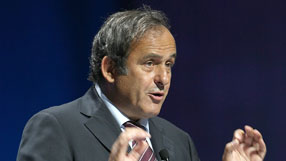
The 54-year-old announced at UEFA's annual congress on Thursday he would stand next year for a second term as president of European football's governing body and such is his popularity that nobody is expected to stand against him.
NEWS:Platini to seek second term
Platini is not just popular through his playing reputation but because he has led UEFA through a difficult time and brought relative tranquility to the organisation as well as ensuring its continued financial good health.
The Frenchman, who succeeded Swede Lennart Johansson in 2007, has set about reforming UEFA and especially the Champions League and the organisation's relationship with the leading clubs, with a drive that has impressed many.
Now 80 and walking with the aid of a stick after bouts of ill-health, Johansson is in Tel Aviv in his role as UEFA's honorary life president and spoke highly of Platini.
"He has done a very good job," Johansson told Reuters. "Of course I did not like losing the election to him but I am impressed with the changes he has made."
Platini's prime achievement has been to make UEFA more inclusive, as one would expect from a team player.
The best features, fun and footballing quizzes, straight to your inbox every week.
His idea of making the Champions League less elitist, giving a chance to champions of smaller countries to compete with the giants of the game, has generally been well received.
"When I was a player with Juventus, we might play European games in Iceland or Albania, that was what the European Cup meant then and it was great for the fans in those countries to see the big teams," said Platini.
"A lot of that stopped with only the big teams in the Champions League, that needed to change. We needed to take the game back to the fans in the smaller countries again."
TWIN IDEALS
His election platform was based on the twin ideals of inclusivity and fairness - and he has gone a long way to meeting those objectives.
A key change has been the inclusion of the major clubs into the European Clubs Association (ECA), replacing the often hostile G14 group of top teams.
The ECA is now part of UEFA and has a significant voice in decision-making.
Platini has also tackled the huge money problems facing the European game with the introduction later this year of UEFA's Financial Fair Play rules.
These regulations say clubs must live within their means, break even and not be in debt to each other or their players or non-playing staff.
Platini wants to limit the role of "sugar daddies" in the game. An indication of that came last year when he expressed astonishment that Manchester City were trying to buy Brazilian playmaker Kaka from AC Milan for 150 million pounds.
"It is absolutely ridiculous," he said at the time. "How can one guy cost 150 million - from a football point of view, a social point of view and every other point of view it is utterly ridiculous."
 Join The Club
Join The Club





